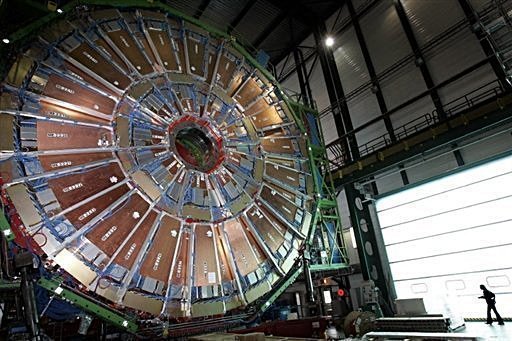
Large Hadron Collider 7 TeV experiment on March 30
European researchers on Tuesday said they would next week move to the next stage of the experiment that will recreate conditions close to the Big Bang that hatched the universe.

The European Organisation for Nuclear Research (CERN) said that it would try to carry out ultra high energy collisions between two microscopic beams of particles at a combined speed of 7.0 TeV (teraelectronvolts) in the world's most powerful atom smasher next Tuesday.
"Just lining the beams up is a challenge in itself: it’s a bit like firing needles across the Atlantic and getting them to collide half way," said CERN’s Director for Accelerators and Technology, Steve Myers.
The laboratory is currently running beams around the collider inside a 27-kilometre (16.8-mile) circular tunnel straddling the Franco-Swiss border near Geneva at the required record energy levels to test the control systems.
"With two beams at 3.5 TeV, we’re on the verge of launching the LHC physics programme," Myers explained in a statement.
"But we’ve still got a lot of work to do before collisions," he added.
The 3.9 billion euro (5.6 billion dollars) Large Hadron Collider (LHC) was restarted after a winter break last month to ready it for collisions at unfathomed energy levels.
CERN Director General Rolf Heuer underlined that it may even take several days to achieve the collisions once the attempt starts.
"The LHC is not a turnkey machine," he explained.
"The machine is working well, but we’re still very much in a commissioning phase and we have to recognise that the first attempt to collide is precisely that. It may take hours or even days to get collisions."
CERN's previous, much less powerful energy collider took three days to record collisions in 1989 from the moment the attempt started.
The new LHC was revived after a 14-month breakdown last November, following a technical glitch that put it out of action days after it was launched in September 2008.
The infinitesmal scale recreation of the conditions that followed the Big Bang is meant to run for 18 to 24 months.
After another technical shutdown, CERN is aiming for full power operation with beams running at 14 TeV after 2012.
(c) 2010 AFP
"Large Hadron Collider 7 TeV experiment on March 30." March 23rd, 2010. www.physorg.com/news188572366.html
www.physorg.com/print188572366.html
March 23, 2010
